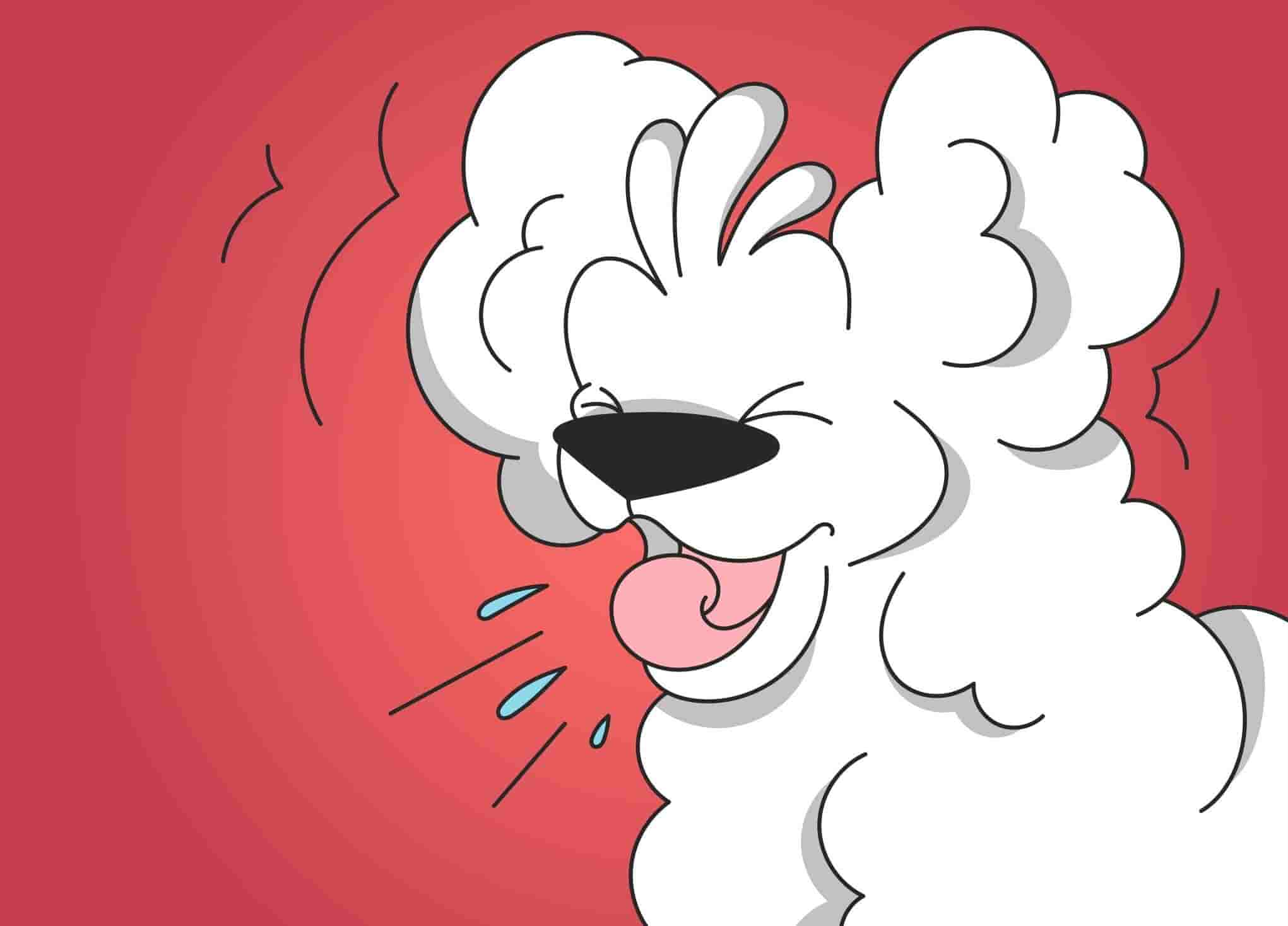You might have encountered your dog sneezing on occasion, just like when we, humans, sneeze when a speck of something tickles our nose or when we get a whiff of a strong scent. This is usually nothing to worry about.
However, if your dog sneezes a lot all of a sudden, you’ve probably asked yourself: “Why is my dog sneezing so much?”
There are numerous reasons for it. Occasional sneezing could just be nothing, but other types of sneezing may indicate a condition that needs to be given attention.
Let’s get to know the reasons why dogs sneeze and when it is necessary to call the vet. This article was reviewed by our expert veterinarian, Chris Vanderhoof (DMV).
Why Dogs Are Sneezing
Scents and Foreign Objects
According to research, because dogs have sensitive noses that love to sniff around everywhere they go, they may sometimes inhale a variety of things. Among the things that dogs may inhale are perfume, air fresheners, hairspray, smoke, pollen, and grass.
While any dog may sneeze due to certain scents or foreign material, scent hounds are more predisposed to it because of their strong fascination for scents.
Do note that if you feel like there’s something stuck in your dog’s nose and your dog keeps sneezing/showing signs of stress, you should contact your vet immediately.
Allergic Reaction
Similar to us humans, dogs may also experience allergies. "Why is my dog sneezing so much?" you might ask. If your dog keeps sneezing, it may be an allergic reaction to pollen or dust, among other allergens.
If it is an allergic reaction, dog sneezing may be accompanied by other symptoms such as itchiness, teary eyes, a runny nose, and even a cough. If you feel that your dog has an allergy, consult with your vet. Meanwhile, some information regarding food allergies in dogs may be found here.
Read more: Signs Your Pet Has Allergies
Morning Sniffles
Do you notice your dog sneezing in the morning? The reason for it could be because they are more exposed to an increased amount of allergens at night. For example, if they sleep near a dusty carpet or surface, this could trigger an allergy flare-up in the morning.
Pollen is also more prevalent very early in the morning, which may lead to your dog sneezing a lot during that time. Repeated sneezing could also be a symptom of other issues, so it's best to talk to your vet to understand what is causing it and what you can do about it.
During Play
When a dog is feeling playful, happy, and excited, they may sometimes ‘play sneeze’. This happens on occasion during play-fighting to signify that they are just enjoying and not showing aggression. They do this as a way to tell their play-mate that they’re not attacking and just want to have fun.
Upper Respiratory Infections
If your dog has an upper respiratory infection, it may lead to sneezing and coughing. "But what could be the cause of these infections?", you might ask.
For one thing, they may catch fungal infections from digging their noses in the soil. This is more common in dogs with longer snouts. Apart from sneezing and coughing, other symptoms such as nose bleeds, pain, and discharge from their noses may also be present.
If so, it would be best to consult with your vet.
Reverse Sneezing
If there is an irritation in your dog's throat, mouth, or nose, it may cause your dog to reverse sneeze. It's a reflex reaction during which the nose suddenly inhales air, producing a weird sound that resembles a snort, honk, or sneeze.
While it might sound strange, however, reverse sneezing in your dog may actually help them eliminate anything that is blocking or causing the irritation.
Reverse sneezing is more common in dog breeds that are smaller, overweight or those with short and flat snouts. Normally, a single short episode of reverse sneezing in a dog is nothing to worry about.
However, if it happens often or if you want to know whether it's affecting your dog's health, it's advisable to talk to a vet about it.
Trauma and Tumors
If your dog is sneezing and looking unwell or stressed, especially if your dog is sneezing blood, it is possible they have a tumor or are experiencing trauma in their nasal airways. Tumors are more common in elderly or geriatric canines.
Meanwhile, a trauma in the nasal airways may be caused by a foreign object in your dog's nose. When your dog is sneezing blood, it would really help to know what should be done given the situation so it's best to contact your vet immediately, apart from administering first aid if the situation calls for it.
Brachycephalic Dog Breeds
There are dog breeds that have shorter snouts, which may make them more prone to respiratory conditions such as nasal infections and reverse sneezing.
These flat-faced dogs or brachycephalic breeds include Pugs, Bulldogs, Boston Terriers, and Boxers, among others. If your brachycephalic dog is constantly sneezing or having issues with their breathing, it's essential to consult with their vet.
Kennel Cough
If your dog is sneezing repeatedly, it may also be a symptom of kennel cough, alongside the symptom of having a nagging cough. If you suspect your dog has kennel cough, it is necessary to consult with your vet because this condition is highly contagious to other dogs, especially to seniors and puppies.
Read more: Kennel Cough in Dogs: a Highly Infectious Respiratory Disease
Generally, if your dog just sneezes occasionally without other signs of sickness and stress, it's probably not a cause for concern. However, if the signs below are present, it may be necessary to contact your vet as soon as possible:
- Sneezing blood/nosebleeds;
- Lethargy;
- Nagging cough;
- Signs of irritation, stress, or pain;
- Fever;
- Blue gums;
- No appetite;
- A thick nasal discharge;
- Breathing difficulties;
- Presence of a foreign object up their nose;
- Dog sneezing a lot.
Treatment
The treatment for dog sneezing would depend on the diagnosis of your vet. If for example they are found to be suffering from an upper respiratory infection, an antibiotic may be prescribed.
If an allergen is suspected to be causing the sneezing, anti-allergy medications may be prescribed.
Meanwhile, when consulting with your vet, it is necessary to divulge your dog's medical history and medications they're taking if any. This is because there are medications that can't be taken together.
Online Vet & Emergency Fund
When your dog is sneezing too much, especially if they're sneezing up blood, it would really help to be able to talk to a vet immediately. These situations make online vet services such as Petcube's Online Vet beneficial for both you and your dog. With Online Vet, you get 24/7 access to consult certified vets anytime and anywhere.
On the other hand, having a pet Emergency Fund is a wise and practical way to save on veterinary expenses while ensuring the health of your dog in the process.
The above services not only help you take care of your pet's health but also gives you peace of mind knowing that you have enough support.
FAQ
Is it okay to self-medicate my dog with human medications?
No. While there are medications that may relieve sneezing in humans, these medications may be dangerous to your dog. It's best to consult with your veterinarian to determine the best treatment (if needed) for your sneezing dog.
What are some home remedies for a sneezing dog?
- Avoid allergens
If your dog seems to be allergic to dust, for example, cleaning their surroundings would be of great help.
- Increase humidity
Humidifiers may help provide moisture and prevent a dry environment that may cause irritation in your dog's nose.
- Flush out their nasal passageway
If there are irritants, allergens, and foreign objects in your dog's nose, saline drops may help to clear it out. However, it would depend on the situation. If unsure, consult with your vet.

Was this article helpful?
Help us make our articles even better









